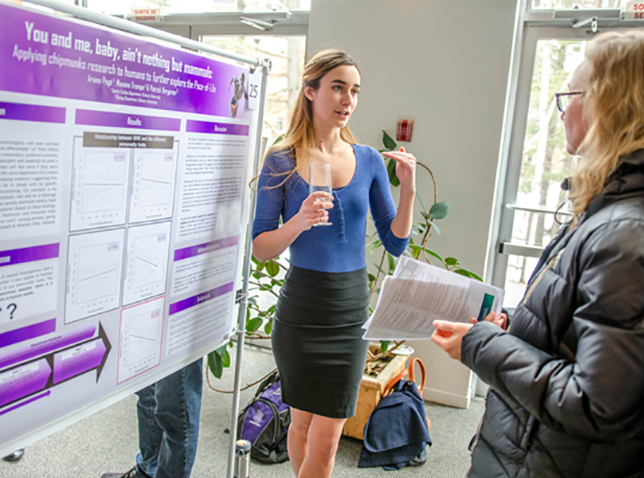A graduate certificate program under Bishop’s department of psychology teaches its students about the field of knowledge mobilization (KMb), a burgeoning field that aims to “maximize the value of academic research by moving it into practice in the non-academic world,” says Dr. Suzanne Hood, an associate professor in Bishop’s psychology department and co-head of the Online Graduate Certificate in Knowledge Mobilization. The program is intended as a “primer on the world of knowledge mobilization,” covering “what it’s about, what it’s relevant to, and the different practices and approaches within it as a profession,” she says.
Since its first cohort in 2019, it has attracted a wide range of students, from prospective and current graduate students to mid-career professionals. “There is increasing recognition within universities, as well as within government, that this is an important part of the knowledge economy and there are jobs to be had and people to be trained,” says Dr. Hood.

Tanisha Campbell was part of the most recent cohort of students. Working full-time, she decided to return to university to pursue a second degree. Keen to start learning sooner than her September start date, she looked for a short program to take in the interim. She says that the skills explored in the certificate, as well as the potential to formalize those skills, attracted her to the Bishop’s program. She says the program also provided some insight into her future direction professionally.
“I realized that maybe education is something that I have a particular interest in and being able to disseminate information to potential students or to a classroom is something that is very important.” says Ms. Campbell. “And so, I’m looking at the field and thinking, well, that’s a skillset that definitely works to my advantage in terms of becoming a professor.”
Canada’s major funding agencies seem to agree. Knowledge mobilization plans are standard requirements in most funding applications. “This has highlighted the need for people with the skillset to create convincing KMb plans and carry them out,” says Dr. Hood. “As an academic, as much as I wish I had all those skills myself, I’ll be the first to say it’s a unique skill set and traditionally an academic researcher is not trained in this kind of work.”
Knowledge mobilization has also become a career unto itself, with the actual job title of knowledge mobilizer becoming more popular in Canada. The position is often seen within research offices in universities, where “knowledge mobilization is a key part of making sure that the work done in an institution is getting out there into the world”, but can also be found in education, government and the private sector, says Dr. Hood. While not all positions may recognize knowledge mobilization in the formal job title, there are many that require “people who are skilled in finding information and then seeing how that information can be applied to that particular context,” she says.
The Bishop’s program aims to prepare students for these opportunities via an intensive online format consisting of three graduate-level courses that run over 12 weeks in total. The first six weeks are spent online, examining the theories and practices of knowledge mobilization while simultaneously developing skills in science communication. In the final six weeks, students get the opportunity to put their new knowledge to work in a KMb practicum.
The practicums are a key component of the program and take place across a range of sectors, says Dr. Hood. One student, for example, supported the promotion of a digital resource that crowdsources tick location data in order to better understand the associated public health problem. Another student developed infographics to help educators and parents better understand COVID-19 public health recommendations related to keeping kids safe and healthy in schools.
While the program currently prioritizes students with knowledge of the research methods applied in psychology, sports studies and biology, they don’t exclude people on that basis. “We’ve had a nice mix of backgrounds in our student cohorts so far,” says Dr. Hood.
Ms. Campbell, for example, came into the program with a bachelor’s degree in psychology and First People studies and is currently pursuing a BA in humanities, with concentrations in international Japanese studies and German studies. The mix of students means the learning is more collaborative, she says, “I was there to learn from professors, but I also learned a lot from my peers.”
Today, the need to put research into action has become increasingly evident. “We’re in an age where information is moving rapidly and we need to maximize its value and get it into the hands of people who can make use of it. Now, more than ever, we need good knowledge mobilizers,” says Dr. Hood.